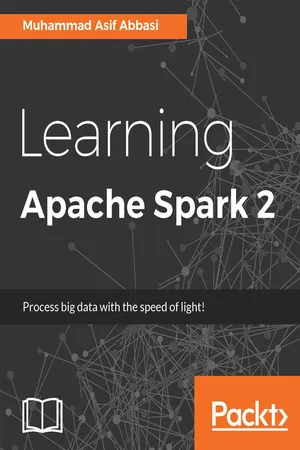
- 356 pages
- English
- ePUB (mobile friendly)
- Available on iOS & Android
Learning Apache Spark 2
About this book
Learn about the fastest-growing open source project in the world, and find out how it revolutionizes big data analyticsAbout This Book• Exclusive guide that covers how to get up and running with fast data processing using Apache Spark• Explore and exploit various possibilities with Apache Spark using real-world use cases in this book• Want to perform efficient data processing at real time? This book will be your one-stop solution.Who This Book Is ForThis guide appeals to big data engineers, analysts, architects, software engineers, even technical managers who need to perform efficient data processing on Hadoop at real time. Basic familiarity with Java or Scala will be helpful.The assumption is that readers will be from a mixed background, but would be typically people with background in engineering/data science with no prior Spark experience and want to understand how Spark can help them on their analytics journey.What You Will Learn• Get an overview of big data analytics and its importance for organizations and data professionals• Delve into Spark to see how it is different from existing processing platforms• Understand the intricacies of various file formats, and how to process them with Apache Spark.• Realize how to deploy Spark with YARN, MESOS or a Stand-alone cluster manager.• Learn the concepts of Spark SQL, SchemaRDD, Caching and working with Hive and Parquet file formats• Understand the architecture of Spark MLLib while discussing some of the off-the-shelf algorithms that come with Spark.• Introduce yourself to the deployment and usage of SparkR.• Walk through the importance of Graph computation and the graph processing systems available in the market• Check the real world example of Spark by building a recommendation engine with Spark using ALS.• Use a Telco data set, to predict customer churn using Random Forests.In DetailSpark juggernaut keeps on rolling and getting more and more momentum each day. Spark provides key capabilities in the form of Spark SQL, Spark Streaming, Spark ML and Graph X all accessible via Java, Scala, Python and R. Deploying the key capabilities is crucial whether it is on a Standalone framework or as a part of existing Hadoop installation and configuring with Yarn and Mesos.The next part of the journey after installation is using key components, APIs, Clustering, machine learning APIs, data pipelines, parallel programming. It is important to understand why each framework component is key, how widely it is being used, its stability and pertinent use cases.Once we understand the individual components, we will take a couple of real life advanced analytics examples such as 'Building a Recommendation system', 'Predicting customer churn' and so on.The objective of these real life examples is to give the reader confidence of using Spark for real-world problems.Style and approachWith the help of practical examples and real-world use cases, this guide will take you from scratch to building efficient data applications using Apache Spark.You will learn all about this excellent data processing engine in a step-by-step manner, taking one aspect of it at a time.This highly practical guide will include how to work with data pipelines, dataframes, clustering, SparkSQL, parallel programming, and such insightful topics with the help of real-world use cases.
Tools to learn more effectively

Saving Books

Keyword Search

Annotating Text

Listen to it instead
Information
Learning Apache Spark 2
Learning Apache Spark 2
Credits
| Authors Muhammad Asif Abbasi | Copy Editor Safis Editing |
| Reviewers Prashant Verma | Project Coordinator Nidhi Joshi |
| Commissioning Editor Veena Pagare | Proofreader Safis Editing |
| Acquisition Editor Tushar Gupta | Indexer Tejal Daruwale Soni |
| Content Development Editor Mayur Pawanikar | Graphics Tania Dutta |
| Technical Editor Karan Thakkar | Production Coordinator Nilesh Mohite |
About the Author
About the Reviewers
I want to thank Packt Publishing for giving me the chance to review the book as well as my employer and my family for their patience while I was busy working on this book.
www.packtpub.com

Why subscribe?
- Fully searchable across every book published by Packt
- Copy and paste, print, and bookmark content
- On demand and accessible via a web browser
Customer Feedback
Preface
The Past
Table of contents
- Learning Apache Spark 2
Frequently asked questions
- Essential is ideal for learners and professionals who enjoy exploring a wide range of subjects. Access the Essential Library with 800,000+ trusted titles and best-sellers across business, personal growth, and the humanities. Includes unlimited reading time and Standard Read Aloud voice.
- Complete: Perfect for advanced learners and researchers needing full, unrestricted access. Unlock 1.4M+ books across hundreds of subjects, including academic and specialized titles. The Complete Plan also includes advanced features like Premium Read Aloud and Research Assistant.
Please note we cannot support devices running on iOS 13 and Android 7 or earlier. Learn more about using the app